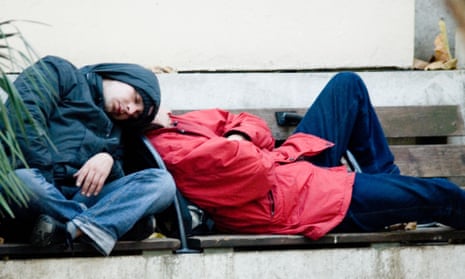Here’s Elaine story. She was attending college and doing well but her stepfather was continuously abusive and she ended up fleeing the family home. This chaos and instability led to her leaving college.
She met an older man in a cafe and stayed with him for a few weeks but this was a dangerous situation. Just turned 19, she approached a council. Fortuntately for Elaine, it was one of the seven London boroughs that partner with us here at New Horizon Youth Centre. That means Elaine was referred directly to us and was a priority when she came to the centre, so she didn’t have to jump through lots of bureacratic hoops.Preventing young people becoming homeless is at the heart of our work and specialised, targeted support for young people like Elaine is essential.
Younger adults are at particular risk of homelessness. Figures from charity Crisis show [pdf] that in five years the number of young people sleeping rough in London has more than doubled and 8% of 16-24 year olds report recently being homeless. Young people make up 20% [pdf] of those presenting for statutory support and half of those seeking advice from homeless services. It’s time they were prioritised. Some 82% of under-25s who go to their local council when they are homeless are currently deemed ineligible (or “non-priority”) for statutory support.
It’s shocking statistics like these that lie behind our pioneering partnership scheme with the seven north London local authorities, allowing the councils to directly refer to us the “non-priority” 18- to 25-year-olds who have approached them for housing assistance.
These young people benefit from our expertise in providing rapid accommodation while helping them into long-term housing or return to the family home, alongside employment support as a key route to prevent homelessness. Our partnership with Network Homes, one of London’s largest housing associations offers safe, affordable accommodation together with support into sustainable employment and long-term housing.
For many young people the future is bleak; leaving home after a family breakdown, often because of overcrowding and poverty, means there is no emotional, financial or social safety net to fall back on. The government’s answer is for young people to stay at home and save. But the bank of mum and dad is not available for these young people and homelessness is often their only option.
Young people can’t survive on the minimum wage and work hours are unpredictable. Plus there’s talk of restricting housing benefit for under-21s. Some young people are escaping gang violence or even war in other countries. There isn’t enough emergency accommodation so they stay on friends’ sofas, on night buses and on the streets, trying to hold on to low-paid jobs or stay in college. Without help, their health and mental wellbeing deteriorates and they may end up as entrenched rough sleepers.
Elaine is completing our independent living programme while staying in a north London shelter. She was lucky that we managed to place her in an emergency shelter, the only one available to our day centre for the whole of London.
It’s still not easy for Elaine. She finds it difficult sharing a room with 10 other people and never gets a good night’s sleep because of the noise. She is working 20 hours a week at a sandwich cafe and is trying to get by on the minimum wage. She wants to rent her own place, but can’t afford the deposit or rent in advance.
Along with advice services supporting her into accommodation, Elaine has benefitted from help in addressing underlying problems such as low self-esteem, emotional and relationship issues. She has been working with our counsellor and communications skills worker and says it has been a lifeline.
More young people like Elaine need that lifeline. We welcome the homelessness reduction bill, but we hope it will be matched by a strategy to release emergency space to keep young people off the streets, increased investment in local authorities and affordable rented accommodation.
Names have been changed.
Sign up for your free Guardian Housing network newsletter with news and analysis sent direct to you on the last Friday of the month. Follow us:@GuardianHousing
